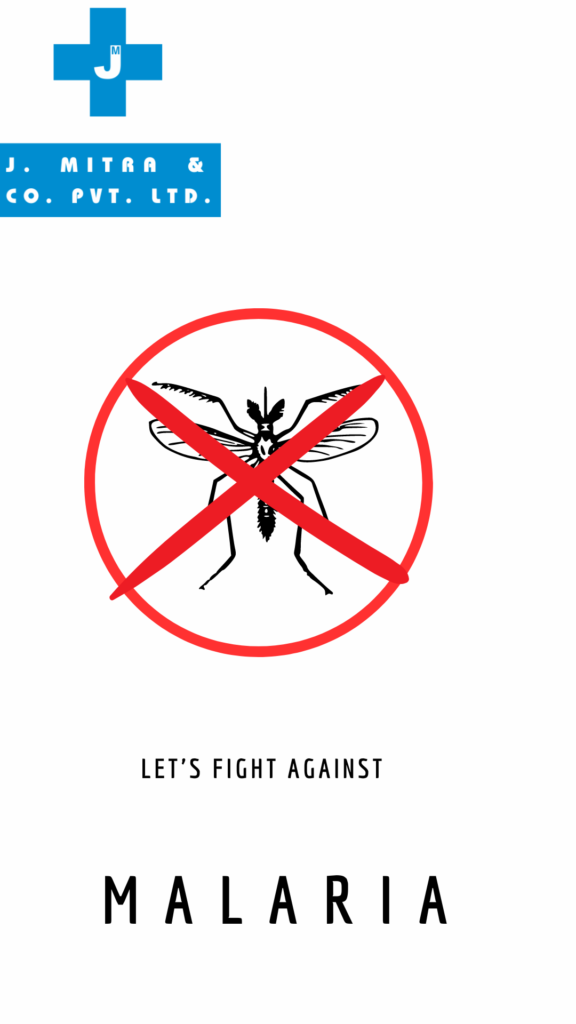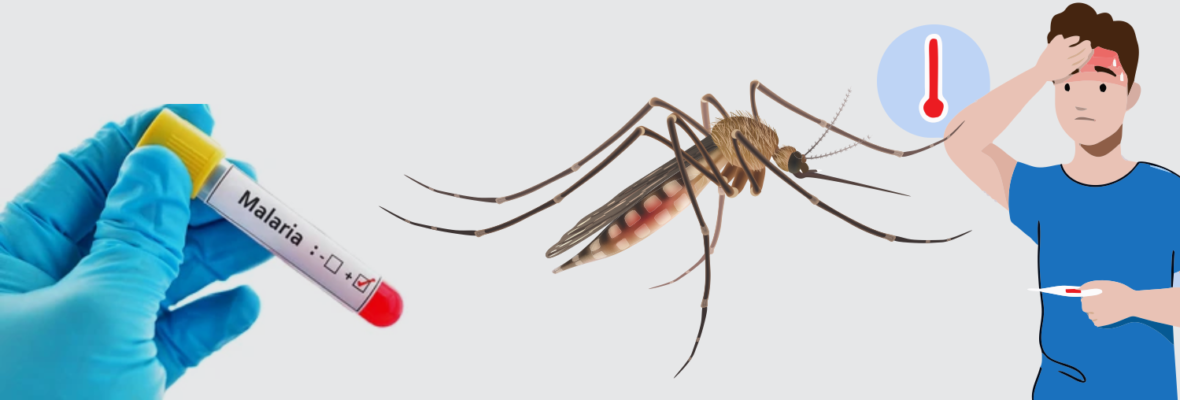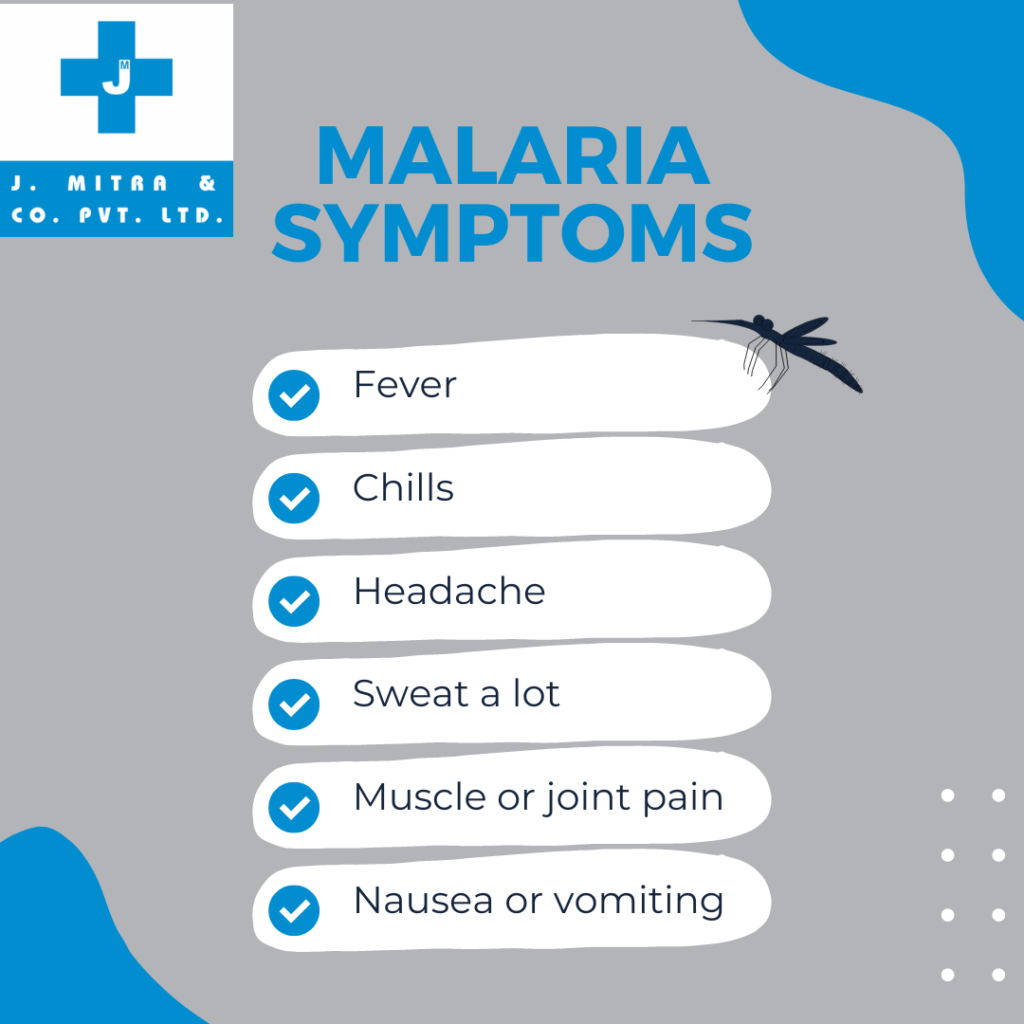Symptoms of malaria
overview

The most common infectious tropical disease is Malaria and an enormous public health issue. It is a parasitic disease characterized by fever, chills, and anemia caused by the malaria parasite, which is transmitted from one human to another by the bite of infected Anopheles mosquitoes. The four malaria parasites that can infect humans: are Plasmodium falciparum, P. vivax, P. ovale, and P. malariae. One more species ;P. knowlesi, which naturally infects macaques in Southeast Asia & also infects humans, is transmitted from animal to human.
In most parts of the country, about 90% of malaria is unstable with relatively low incidence but with a risk of increasing cases in epidemic form every 7 to 10 or more years. Malaria mortality in India is only due to P. falciparum as it causes cerebral Malaria and may lead to death (48-52% of total cases). Millions of people worldwide, particularly in sub-Saharan Africa, are affected by malaria each year, which is a major public health concern. The diseases can be avoided by taking antimalarial medications, using insecticide-treated bed nets, and indoor residual spraying. For lessening the severity of the diseases and halting their spread, early diagnosis and treatment are also crucial.
12 Common Symptoms of Malaria:
- Fever
- Chills
- General feeling of discomfort
- Headache
- Nausea and vomiting
- Diarrhea
- Abdominal pain
- Muscle or joint pain
- Fatigue
- Rapid breathing
- Rapid heart rate
- Cough
Malaria sufferers can have recurrent “attacks.” Typically, an attack begins with chills and shivering, then a high fever, followed by perspiration and a return to normal body temperature.
Typically, a few weeks after being bitten by an infected insect, malaria signs and symptoms appear. Certain malaria parasite strains, however, can slumber in your bloodstream for up to a year.
“The malaria transmission cycle consists of the following stages”:
Female Anopheles: mosquitos become infected with the Plasmodium parasite after feeding on the blood of an infected human. Inside the mosquito, the parasite multiplies and migrates to the salivary glands.
Mosquito bites human: The parasite is then injected into the person’s bloodstream by the infected mosquito.
Parasites multiply in the liver: The parasite enters the liver and multiplies within the cells of the liver.
Mosquitoes become infected: When a mosquito bites an infected person, it can contract the parasite and spread it to other humans through subsequent bites.
This cycle will continue as long as infected humans and mosquitos are present, causing malaria to spread in affected communities. To break the transmission cycle, efforts are made to control the mosquito population, treat infected people, and prevent mosquito bites by using insecticide-treated bed nets and other measure
Complications Arises due to malaria in humans:
Malaria is a potentially fatal disease caused by a parasitic infection of red blood cells. Malaria complications can vary depending on a number of factors, including the type of parasite that causes the infection, the age and general health of the person infected, and how quickly the infection is diagnosed and treated. Malaria complications in humans include the following.
Anemia: Malaria can cause anaemia, a condition in which the body does not have enough red blood cells to transport oxygen to the tissues. Fatigue, weakness, shortness of breath, and other symptoms can be caused by anaemia.
Cerebral malaria: Is a severe form of malaria that affects the brain and can result in seizures, confusion, coma, and death. It is more common in young children and pregnant women.
Kidney failure: In severe cases, malaria can damage the kidneys and cause kidney failure, which can be life-threatening.
Respiratory distress: Malaria can cause acute respiratory distress syndrome (ARDS), a severe lung condition characterised by shortness of breath, coughing, and low blood oxygen levels.
Liver failure: Malaria can cause liver failure in rare cases, leading to a variety of serious complications such as jaundice, fluid buildup in the abdomen, and confusion.
Low blood sugar: Malaria can result in hypoglycemia, a condition in which blood sugar levels fall dangerously low. This can result in fatigue, confusion, seizures, and even coma.
Pregnancy complications: Malaria infection during pregnancy increases the risk of miscarriage, stillbirth, premature birth, and low birth weight.
If you suspect you have malaria, it is critical to seek medical attention as soon as possible because early diagnosis and treatment can help prevent complications and improve outcomes
Diagnosis, and prevention
Malaria can be treated in 2 days if a timely diagnosis is performed. However, delays in diagnosis/treatment can be fatal.
Malaria diagnosis by rapid diagnostic tests (RDTs) based on antigen ( HRP-2 /pLDH) detection is recommended by WHO for all patients before administering treatment.
As per NACO guidelines, all blood units in a blood bank must be tested for malaria parasites using a validated and sensitive antigen test. Malaria Diagnosis is usually preferred by using ELISA ‘an Enzyme-linked immunosorbent assay, a screening test used to detect Plasmodium species based on pLDH Antigen inpatient whole blood. In Blood Banks & Labs equipped with ELISA Reader and washer, prefer processing a large number of samples in a 96 microwell plate with a turnaround time of 2 -3 hours for 90 samples.
Malaria Rapid diagnostic Card tests (RDTs) based on antigen ( HRP-2 /pLDH) detection are visual tests with a user-friendly test procedure. There is no need for a skilled microscopist & and equipment to provide accurate test results within 20 minutes. These are based on lateral immunochromatography sandwich immunoassay, and their performance is validated against well-characterized panels of Malaria parasites as per intended use.
J Mitra & Co. offers both ELISA (Malaria Ag Microlisa) & a wide range of 5 different Rapid Antigen card tests for screening and diagnosis of Malaria parasites based on HRP-2 &/OR pLDH antigen. Symptoms of malaria
Malaria is a serious illness; however, one can lower the risk of infection by taking preventative measures; protecting oneself from mosquito bites, and intermittent treatment with antimalarial and insecticide-treated bed nets. As a result, there will be a decline in malaria cases by 84.4 percent and their deaths by 83.6 percent in 2020. Symptoms of malaria
Awareness about the disease, continual use of preventative measures & an early and accurate diagnosis is essential for effective management of the disease and solid malaria surveillance.

Symptoms of malaria Symptoms of malaria Symptoms of malaria
Symptoms of malaria
Symptoms of malaria Symptoms of malaria Symptoms of malaria



